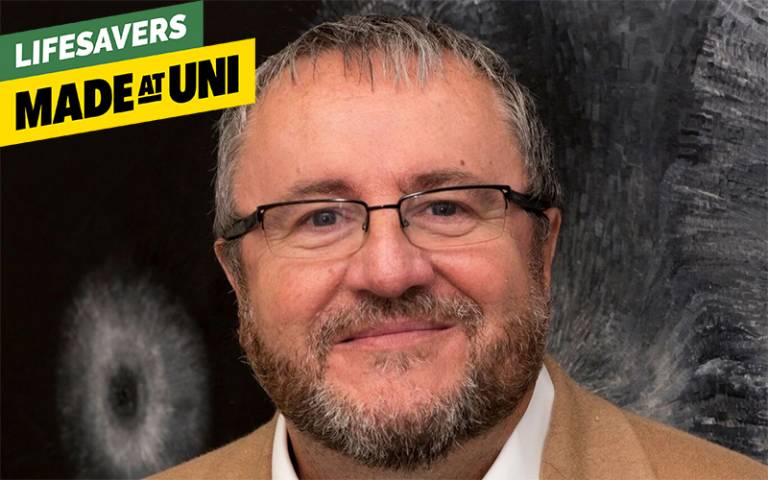Eye treatment pioneer named among UK’s 100 national lifesavers
16 May 2019
World-leading eye researcher, Professor Pete Coffey, who pioneered a treatment enabling people whose vision has been destroyed by disease to see again, has been named as one of the Nation’s Lifesavers.

Last year two people, whose sight had deteriorated due to age-related macular degeneration (AMD), were able to see the world again, following groundbreaking stem cell based therapy.
The disease is the most common form of blindness in the UK, affecting 600,000 to 700,000 people. The two patients, a woman in her early 60s and a man in his early 80s, had the severe form of the condition (wet AMD) and declining vision.
Pioneered by Pete Coffey, Professor of Visual Psychophysics (UCL Institute of Ophthalmology), the treatment effectively treats the disease, allowing people to read and see faces.
Today (May 16, 2019), Professor Coffey is named as one of the Nation’s Lifesavers, which recognises the top 100 individuals or groups based in universities across the UK whose work is saving lives and making a life-changing difference to our health and wellbeing.
They have been named for the first time today as part of Universities UK’s MadeAtUni campaign, which brings to life the impact of universities on families, communities and wider society.
The Nation’s Lifesavers are battling diseases, tackling inequality, helping new parents and children enjoy the best start in life and supporting older people.
UCL President & Provost, Professor Michael Arthur Professor Arthur said: “Professor Pete Coffey’s recognition as one of the Nations’ Lifesavers is wholly deserved.
“He and his team have developed cutting edge therapies, enabling people to regain our most precious sense – sight.
“His work progressing regenerative medicine, opens the door to new treatment options for people with age-related macular degeneration, providing hope to millions with this common disease.”
Professor Coffey has co-led the London Project to Cure Blindness since 2007 in collaboration with Professor Lyndon da Cruz, a retinal surgeon at Moorfields Eye Hospital.
The team’s ground-breaking procedure involves implanting a “patch” of stem cells over the back of the eye.
To develop the therapy, Professor Coffey and his team created the cells, perfected a new surgical technique and new surgical tools to implant them, and pioneered imaging techniques to monitor their progress once in the eye.
MadeAtUni highlights impact of UK universities on life and society
Supporting the UUK campaign, Professor Michael Arthur said: “Universities are transforming lives everyday by working to solve some of the biggest issues facing the world and by engaging with their local communities.
“The breadth and impact of discoveries made at UK universities highlighted by this campaign is extraordinary and shows how we are all benefitting from the innovative and hard work of researchers.
“At UCL, we’re extremely proud of our ground-breaking research which spans a multitude of areas, from communications technology and space to sustainable cities and education.”
Professor Dame Janet Beer, President of Universities UK, said: “When people think of lifesavers they understandably tend to focus on the dedication and skill of our doctors, nurses, carers, and paramedics – many of whom are trained at universities.
"Every day, up and down the country, universities are also working on innovations to transform and save lives. Research taking place in universities is finding solutions to so many of the health and wellbeing issues we care about and the causes that matter.
“By proudly working in partnership with charities, the NHS and healthcare organisations, universities are responsible for some of our biggest health breakthroughs and in revolutionising the delivery of care.
“This campaign is a chance to bring to life the wonderful and often unexpected work going on every day in our universities and to celebrate some of the people working to make a life-changing difference to us all.”
Campaign ambassador Dame Katherine Grainger, Chancellor of Oxford Brookes University, Chair of UK Sport and Britain’s most decorated female Olympic atlete, commented: “MadeAtUni Lifesavers celebrates the researchers and their teams in universities across the country who are providing innovations, breakthroughs, cures and treatments to improve the health and wellbeing of adults and children, locally, nationally and internationally.
“I know from my own direct experience at Oxford Brookes that our universities are treasuries in which to share knowledge, test established notions and evidence about health, and ultimately create fresh approaches which can help us all to thrive.”
Research, carried out by Britain Thinks, shows the public are proud of UK universities but have little understanding of the benefits they bring, with most not being aware that UK academics are behind many of the discoveries that save lives and keep up healthy.
Links
- Professor Pete Coffey
- UCL Institute of Ophthalmology
- The London Project to Cure Blindness
- MadeatUni campaign website
- Universities UK
Media contact
Henry Killworth
Tel: +44 (0)20 7679 5296
Email: henry.killworth [at] ucl.ac.uk
 Close
Close

